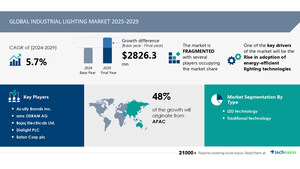NEW YORK, Jan. 27, 2025 /PRNewswire/ -- Report with market evolution powered by AI - The global less-than-truckload (LTL) market size is estimated to grow by USD 110.7 billion from 2025-2029, according to Technavio. The market is estimated to grow at a CAGR of 6.8% during the forecast period. Advances in e-commerce in retail sector is driving market growth, with a trend towards emergence of big data in global less-than-truckload (LTL) market. However, rising prices of ltl carriers poses a challenge. Key market players include Allcargo Logistics Ltd., ArcBest Corp., Averitt Express Inc., Challenger Motor Freight Inc., CMA CGM SA Group, Debon Logistics Co. Ltd., Deutsche Post AG, Estes Express Lines, FedEx Corp., J B Hunt Transport Services Inc., JRC Dedicated Services Co., Knight Swift Transportation Holdings Inc., Kuehne Nagel Management AG, Nippon Express Holdings Inc., Old Dominion Freight Line Inc., R L Carriers Inc., SouthEastern Freight Lines, United Parcel Service Inc., XPO Inc., and Yellow Corp..
Key insights into market evolution with AI-powered analysis. Explore trends, segmentation, and growth drivers- View Free Sample PDF
Less-Than-Truckload (LTL) Market Scope |
|
Report Coverage |
Details |
Base year |
2024 |
Historic period |
2019 - 2023 |
Forecast period |
2025-2029 |
Growth momentum & CAGR |
Accelerate at a CAGR of 6.8% |
Market growth 2025-2029 |
USD 110.7 billion |
Market structure |
Fragmented |
YoY growth 2022-2023 (%) |
6.4 |
Regional analysis |
APAC, North America, Europe, Middle East and Africa, and South America |
Performing market contribution |
APAC at 60% |
Key countries |
China, US, Japan, Germany, Canada, India, France, South Korea, UK, and Italy |
Key companies profiled |
Allcargo Logistics Ltd., ArcBest Corp., Averitt Express Inc., Challenger Motor Freight Inc., CMA CGM SA Group, Debon Logistics Co. Ltd., Deutsche Post AG, Estes Express Lines, FedEx Corp., J B Hunt Transport Services Inc., JRC Dedicated Services Co., Knight Swift Transportation Holdings Inc., Kuehne Nagel Management AG, Nippon Express Holdings Inc., Old Dominion Freight Line Inc., R L Carriers Inc., SouthEastern Freight Lines, United Parcel Service Inc., XPO Inc., and Yellow Corp.. |
Market Driver
The Less-Than-Truckload (LTL) market is witnessing significant growth in various sectors like Agriculture, Fishing, Forestry, Construction, Manufacturing, Oil and Gas, Mining and Quarrying, and E-commerce. Freight transport volume is increasing due to the rise in demand for retail products and MSME sector goods. Freight pricing trends are influenced by fuel prices, with petrol and diesel affecting truckers' costs. Oil demand and marketing companies' crude oil purchases impact freight transportation expenses. LTL services cater to small and medium shipments, offering scalability and affordability. Road freight services dominate the logistics sector, but air, rail, and ground shipping also play essential roles. Full Truckload carriers and specialized carriers serve industries with large cargo requirements, while LTL freight carriers cater to shippers with lower volume needs. Operational efficiency and economic conditions are crucial factors in LTL pricing, with density-based pricing becoming common. Startups and industrial shipping benefit from LTL's flexibility.
LTL logistics companies and shippers are leveraging big data to transform vast amounts of information into a competitive edge. Big data offers advantages such as customized services, identifying market trends, and agility for new business models. In the European logistics sector, the implementation of big data analytics is still in its infancy due to IT disparities. Big data significantly benefits the logistics industry in three key areas: operational efficiency, customer experience, and new business models. By optimizing core activities like resource utilization, delivery time, and geographical coverage, big data enhances operational efficiency. Improved customer experience is achieved through personalized services and real-time tracking. New business models can be developed based on data-driven insights, creating agility and innovation in the industry.
Request Sample of our comprehensive report now to stay ahead in the AI-driven market evolution!
Market Challenges
- The Less-Than-Truckload (LTL) market faces unique challenges in various industries like Agriculture, Fishing, Forestry, Construction, Manufacturing, Oil and Gas, Mining and Quarrying. Freight volume in these sectors can be unpredictable, making it difficult for freight transport services to optimize their truck capacity. E-commerce and MSME sector growth contribute significantly to the LTL market, increasing the demand for scalability and affordability. Freight pricing trends are influenced by fuel costs, truckers' availability, and operational efficiency. Full Truckload carriers and specialized carriers cater to large shipments, leaving LTL services for small to medium-sized cargo. Density-based pricing and economic conditions impact LTL shipping costs. Logistics sector players must navigate these challenges while ensuring flexibility for shippers, adapting to retail and industrial shipping needs, and offering ground, air, and rail shipping solutions.
- The Less-Than-Truckload (LTL) market is currently facing several challenges that are driving up prices. Rising costs, increased demand, and surging e-commerce deliveries are putting pressure on LTL carriers. Additionally, there's a shortage of qualified drivers, tightening Truckload (TL) capacity, and growing government regulations. LTL carriers are investing heavily in their trucks, drivers, and facilities to meet demand, but fuel expenses pose a significant risk. Volatility in fuel prices can impact their fuel surcharge revenues, making fuel costs a major concern for LTL profitability. Last-mile delivery operations also present challenges for LTL carriers, requiring them to maintain profitability while ensuring transparency and improving delivery efficiency.
Discover how AI is revolutionizing market trends- Get your access now!
Segment Overview
This less-than-truckload (ltl) market report extensively covers market segmentation by
- Type
- 1.1 Long-haul carriers
- 1.2 Superregional carriers
- 1.3 Regional carriers
- Capacity
- 2.1 Light LTL volume
- 2.2 Heavy LTL volume
- Geography
- 3.1 APAC
- 3.2 North America
- 3.3 Europe
- 3.4 Middle East and Africa
- 3.5 South America
- End-User
1.1 Long-haul carriers- The long-haul segment of the Less-Than-Truckload (LTL) market is the largest revenue generator, accounting for significant market share. Long-haul LTL carriers, also known as national carriers, transport shipments over long distances, typically within 3 to 5 days. The average haul length is around 1,200 miles. These carriers operate through a hub-and-spoke network and often have labor unions. The long-haul LTL market is projected to grow steadily due to economic activity. This segment uses a traditional hub-and-spoke model, where freight is collected, consolidated, and dispatched from a centralized location. Long-haul LTL carriers offer value-added services, including packing, unpacking, and door-to-door collection. Competition is intense in this market, with alternatives like railways, airways, and seaways. Many businesses outsource their freight needs due to the high investment and expertise required for in-house transportation. Contractual logistics providers offer efficient and timely transportation, benefiting both shippers and customers. Additional services provided by long-haul LTL carriers include project logistics, network planning, cargo insurance, value-chain optimization, and customs brokerage. With the rise in industrial activities worldwide, the long-haul LTL carriers segment is poised for growth during the forecast period.
Download a Sample of our comprehensive report today to discover how AI-driven innovations are reshaping competitive dynamics
Research Analysis
The Less-Than-Truckload (LTL) market plays a crucial role in transporting various goods, including those from sectors like Agriculture, Fishing, Forestry, Construction, Manufacturing, Oil and Gas, Mining and Quarrying, and Retail. LTL freight services offer scalability and affordability, making them an attractive option for MSMEs and shippers with smaller freight volumes. The logistics sector, particularly road freight services, benefits significantly from LTL shipping. Freight volume in the LTL market is influenced by factors such as e-commerce growth and the increasing demand for retail products. Freight pricing trends are influenced by factors like fuel prices, trailer capacity utilization, and cargo weight. The oil and gas industry, for instance, may require specialized LTL services for transporting equipment and supplies. Crude oil and other bulk commodities are typically transported via Full Truckload shipments, while LTL services are ideal for smaller cargo. Freight carriers offer flexibility in terms of pickup and delivery schedules, making LTL an attractive choice for businesses with varying shipping needs. The affordability and scalability of LTL services contribute to their growing popularity in various industries.
Market Research Overview
The Less-Than-Truckload (LTL) market caters to the freight transportation needs of various industries such as Agriculture, Fishing, Forestry, Construction, Manufacturing, Oil and Gas, Mining and Quarrying, and Retail, among others. The market's freight volume is significantly influenced by the MSME sector, E-commerce, and the Logistics sector's growth. Freight pricing trends in the LTL market are influenced by factors like fuel prices, operational efficiency, and economic conditions. The market offers scalability, affordability, and flexibility, making it an attractive option for small and medium-sized shipments. Key industries like Manufacturing, Oil and Gas, and Mining and Quarrying often require specialized LTL services due to the density and nature of their cargo. The market comprises various players, including Full Truckload Carriers, Specialized Carriers, and Freight Carriers, catering to the diverse needs of shippers. The LTL market is influenced by factors like fuel prices (Petrol, Diesel), crude oil demand, and the pricing strategies of oil marketing companies. The market offers various shipping options, including Ground Shipping, Air Shipping, Rail Shipping, and Volume LTL services, with density-based pricing models. Truckers play a crucial role in the LTL market, ensuring timely and efficient transportation of cargo. The market's operational efficiency is influenced by factors like trailer capacity, cargo handling, and delivery times. The LTL market's future growth is expected to be driven by the increasing demand for retail products and the growing importance of the logistics sector in various industries.
Table of Contents:
1 Executive Summary
2 Market Landscape
3 Market Sizing
4 Historic Market Size
5 Five Forces Analysis
6 Market Segmentation
- Type
- Long-haul Carriers
- Superregional Carriers
- Regional Carriers
- Capacity
- Light LTL Volume
- Heavy LTL Volume
- Geography
- APAC
- North America
- Europe
- Middle East And Africa
- South America
- End-User
7 Customer Landscape
8 Geographic Landscape
9 Drivers, Challenges, and Trends
10 Company Landscape
11 Company Analysis
12 Appendix
About Technavio
Technavio is a leading global technology research and advisory company. Their research and analysis focuses on emerging market trends and provides actionable insights to help businesses identify market opportunities and develop effective strategies to optimize their market positions.
With over 500 specialized analysts, Technavio's report library consists of more than 17,000 reports and counting, covering 800 technologies, spanning across 50 countries. Their client base consists of enterprises of all sizes, including more than 100 Fortune 500 companies. This growing client base relies on Technavio's comprehensive coverage, extensive research, and actionable market insights to identify opportunities in existing and potential markets and assess their competitive positions within changing market scenarios.
Contacts
Technavio Research
Jesse Maida
Media & Marketing Executive
US: +1 844 364 1100
UK: +44 203 893 3200
Email: [email protected]
Website: www.technavio.com/
SOURCE Technavio

WANT YOUR COMPANY'S NEWS FEATURED ON PRNEWSWIRE.COM?
Newsrooms &
Influencers
Digital Media
Outlets
Journalists
Opted In






Share this article